Archive for July, 2008
Over at Let’s Play Math, Denise has been writing about some of the search terms that end up sending people to her site and the results are rather interesting. For example, this month over 300 people found their way onto Let’s Play Math while searching for the term ‘Christmas’. Some people really like to plan ahead I guess. Other search terms that appear in her logs include things like “cute math expressions” and “ye olde math quiz”.
Denise challenged others to look through their own search logs to see what they come up with and it sounded like a fun way of passing a lunch hour so I took the bait.
It turns out that the most popular search term that gets people to walkingrandomly at the moment is ‘tangram’ since it is the top result on google images from google.co.uk. This surprised me as I think I have only mentioned tangrams once when I was talking about my Wolfram Demonstration for the broken heart tangram. The next most popular term is ‘mathematica’ which doesn’t surprise me at all as I do talk about it a lot although I am not (yet) the top search result for that particular piece of software.
So…what else brings people here according to my logs? The vast majority of the searches people used are pretty much the sort of thing I expected to see as I have written about them. Things like mathematics on pocket PC, Mathcad bugs, The Rosenbrock Function and Mathematica 6.0.3. Others were a bit more surprising though
- Walking in latex
I imagine that this particular searcher was bitterly disappointed!
- does anyone use programmable calculators anymore
Interesting question but I have no idea what the answer might be. I certainly don’t use them. Do you?
- mathworks sucks
I deal with the The Mathworks on a regular basis and, on the whole, I would disagree with this statement. Generally, I find them to be a pleasant, knowledgeable and helpful bunch but clearly this searcher thinks otherwise.
- mathematica 6.0.3 keygen
Tut tut. You’ll have no luck here, if you want to use it then you should pay for it. Use SAGE if you want (legal) free maths software rather than stealing other peoples work.
- mom in latex
I am starting to detect a trend here….
- secret math equations
Well if I told you what they were then they wouldn’t be a secret anymore.
- scary looking integrals
I plan on having a lot more of these soon.
- how free solved numericle problem in chemistry of 12th
Say what?
- gorgeous looking libraries
I do hope they found some.
- i have used full simplify to my equation in mathematica but i want to see the intermediate steps is that possible
No it’s not I’m afraid and if you could then it would not be very useful. Mathematica does maths VERY differently to the way you or I might.
- math make silver
I wonder what this person was looking for?
On the whole I am disappointed – nowhere near as many fun search terms as Denise but I did only go back a couple of months before I started going cross eyed from staring at thousands of terms. If you have a blog – what can you find in your search logs?
If you enjoyed this article, feel free to click here to subscribe to my RSS Feed.
I like VirtualBox and find myself using it more and more often but had a little problem with it this morning that took me a few minutes to solve. This post is essentially a note to self. It would be a bonus if it turned out to help someone else too (please let me know if it does).
So I am using version 1.5.6 of VirtualBox on Ubuntu 8.04 (hardy Heron) and I wanted to clone a vdi image to save me from having to go through the Operating System installation from scratch for a particular virtual machine. I navigated to the directory containing the vdi images and issued the command
VBoxManage clonevdi ./clean_machine.vdi ./copy_of_cleanmachine.vdi
which resulted in the error
Text = Could not access hard disk image ‘/home/mike/.VirtualBox/clean_machine.vdi’ (VERR_FILE_NOT_FOUND)
The file definitely was there so this confused me for a bit. It turns out that you need to provide the full path to your vdi files – not just the relative path. Something like
VBoxManage clonevdi /home/mike/.VirtualBox/VDI/clean_machine.vdi /home/mike/.VirtualBox/VDI/copy_of_cleanmachine.vdi
did the trick.
If you found this article useful, feel free to click here to subscribe to my RSS Feed.
I know this is completely off topic for this blog but I need to vent – so I apologize.
I love my home town of Sheffield but work in Manchester and so I, like many others, face a daily commute by train. The journey is only around 50 minutes to an hour long and it is usually very pleasant, complete with views of the beautiful Pennines and the chance to relax with a book, DVD or however else you might choose to idle away an hour or so.
Sometimes though, it goes horribly wrong. The train company may spontaneously decide to half the number of carriages at peak time for example which results in everyone getting very up close and personal with one another. Standing up for an hour with your nose in someone’s armpit after a full days work is not the nicest start to your evening and should really never happen, especially when you consider the fact that the ticket is so expensive.
It really is expensive too, a sizeable proportion of my salary in fact, so the last time this happened I had the temerity to complain to the guard (a very un-british thing to do but I had had a BAD day). I was paying an obscene amount of money for the pleasure of having my nose in someone’s armpit and could I have the address of the train’s complaint department please? I was informed that my money only actually bought me the right of carriage, not the right to a seat.
That’s right ladies and gentleman – almost 3000 pounds a year for the right to stand on a train. Well if that’s the case then why are they pretending? Why bother with seats at all? They would save even more money (and fuel I guess) by ripping out all of the seats and just being done with it. At least then I wouldn’t be able to complain about the lack of seats because I would never expect there to be any.
Furthermore they could spend the saved money on more people to check that I actually have a ticket because they obviously don’t do that enough. On a bad day my ticket can be checked by 8 different people – once at Sheffield station, twice on the train itself and once as I attempt to leave Manchester station and then the same again in the opposite direction. To be fair it’s more usual to only have it checked 4 or 5 times but it still seems like overkill to me.
Unfortunately I have no choice if I don’t want to leave my life and home in Sheffield (or my job in Manchester). I have to commute and, since I don’t know how to drive, the train is my only option. So I pay and suffer (and occasionally complain of course).
A final note – it turns out that UK commuters have it worse than cattle. Figures!
The second Integral Of The Week (IOTW) is rather different from the first in that I am going to give you the evaluation. Your task is to prove it.
![]()
But WAIT! Almost every time I have seen this integral evaluated, it has been done by squaring it and converting to polar co-ordinates and that’s the one method of evaluation you can’t use for this particular challenge. I am looking for more ‘interesting’ proofs. Have fun.
Solutions can be posted in the comments section or sent to me by email (obtaining my email address is another puzzle for you to solve) and will be discussed in a future post. Feel free to send your solution in just about any format you like – plain text, uncompiled Latex, PDF, postscript, Mathematica, ODF, even Microsoft Word. When I get around to posting the solutions I will attempt to standardize them (to PDF probably).
Update: Several solutions have been posted in the comments.
Here’s one for catsynth – Inspired by xkcd, Andrew J. Bennieston took a tiger into Fourier Space and back using Mathematica. The result looks kinda cool.
Someone came to visit me today with a MATLAB mex problem and, among other things, I needed to install gcc for them. Now on a Linux machine this would have been trivial. Something like
yum install gcc
or
apt-get install gcc
would do the trick, depending on which flavour of Linux you are using. One command, a quick download and you’re done. Couldn’t be simpler.
I am as green as grass when it comes to Mac usage and so I assumed that there would be some Mac equivalent to these commands but it seems that this is not the case (please please correct me if I am wrong). As far as I can tell, one needs to install something called Xcode in order to get gcc which is 1 Gigabyte in size. You heard me right – 1GB….for gcc! Of course it isn’t just gcc taking up that 1GB – you get lots of other gubbins too – but I don’t want all of the other gubbins. I just want gcc.

But the size isn’t the worst bit. It turns out that you have to go through a registration process in order to get your hands on XCode – giving Apple information such as your email address, home address, what area you work in, what you are going to use XCode for etc etc
All this to get hold of one of the most fundamental open-source applications there is. There has to be a better way. If anyone can enlighten me as to what that better way might be I would be very grateful.
The 36th Carnival has been posted over at Rigorous Trivialities with a nice selection of articles for your enjoyment. I missed their call for submissions and so am feeling rather annoyed with myself at the moment!
The 37th carnival needs a host so why not head over to The Carnival of Mathematics to sign up for the job.? I would do it but I have already done it twice and it’s not fair for me to hog the show. As well as providing a service to the mathematical blogging community, it does wonders for your Technorati rating ;)
I read a lot of maths related blogs, books and journals and often come across math problems that are either fun, interesting or both for one reason or another. Some I manage to solve on my own, others I solve using a CAS package like Mathematica or Matlab and then of course there are those that I solve by cheating and using google! There are also one or two that I am working on that I (or anyone else for that matter) might never solve – but I remain hopeful.
I find that solving maths problems is a lot of fun and much more satisfying than solving other types of puzzle such as crosswords or Sudoku. I am not saying there is anything wrong with these puzzles but, on the whole, I prefer to solve mathematical or computational problems.
Many other websites offer sets of problems for their readers to solve and I thought it was high time I got in on the act. Blinkdagger and Wild about Math, for example, are currently offering prizes for the solution of their problems. I will not be offering prizes for solving any of my problems but it is quite possible that you will get some warm-fuzzy feelings of pride for solving some of the tricky ones. You (and I) might even learn something too.
For the first few weeks I thought I would focus on problems from integral calculus because the solution of integrals requires techniques from many areas of mathematics such as algebra, complex analysis, numerical analysis, special functions and more. For most (but not all) of the integrals I will be featuring I know of at least one solution method already and will be posting that solution in a few weeks time. Part of the fun of integration though, is the fact that there are usually several possible solutions to any given problem and I hope to learn some new tricks and methods from you as I go along.
This week’s integral is a tricky one in my opinion (tricky if you choose not to google for it at least) but the answer can be expressed in terms of elementary functions.
![]()
Solutions can be posted in the comments section or sent to me by email (obtaining my email address is another puzzle for you to solve) and will be discussed in a future post. Again, there are no prizes on offer (I am far too poor for that) but hopefully that won’t put anyone off from having a go anyway.
Update (15th July 08): If you have posted a solution in the comments and it hasn’t appeared yet it is because I am holding back for a while to allow other people to have a go. I’ll keep all comments containing solutions on hold until the 25th July.
If you enjoyed this article, feel free to click here to subscribe to my RSS Feed
Wolfram Research released version 6.0.3 of Mathematica a little while ago now but, as usual, it took me a while to find the time to download and install it. Over the last month or so I have been bothering various people at Wolfram Research for more details on this new release and I am happy to say that they have been very helpful – so a big thanks to them for much of what follows. So let’s see what new goodies 6.0.3 has got compared to version 6.0.2
Possibly the most important thing you need to know about this release (if you are a Windows user) is that you should completely uninstall previous versions of Mathematica 6.x before installing 6.0.3. Exactly what might go wrong is still a mystery to me but, if I get really bored, I might try installing 6.0 side by side with 6.0.3 on a virtual machine to see what happens. If you would prefer it that everything just worked though, I suggest you take their advice.
Now that we have that out of the way – let’s look at the actual updates. One of the most visual changes is the work that Wolfram have done on the Documentation Center. There is now a comprehensive list of the standard extra packages included in the help system – something that was missing before. This gives a very useful overview of the many packages that are included with Mathematica but not loaded by default such as Combinatorica, Equation Trekker and the Vector Analysis Package. An online version of this list can be found here.
Mathematica 6.0.3 also includes quite a large number of bug fixes. In no particular order – the following have been fixed
- Under Microsoft Windows Vista there was a bug in 6.0.2 and earlier that manifested itself when you tried to print multiple copies of a notebook. The number of copies printed was the square of the number of copies selected. Version 6.0.3 prints the correct number of copies.
- On Linux, If you were running 6.0.2 or below on a compositing window manager such as Compiz then the Mathematica front end would display some inactive, blank windows. There was also a problem with the font rendering on distributions such as Ubuntu Hardy Heron and Fedora Core 9 (as described here) . This has now been fixed.
- In previous versions there was a problem with MatrixForm and TableForm in that the TableAlignment option would be ignored and everything would be aligned to the left no matter what you selected. For example in 6.0.2
MatrixForm[10^RandomInteger[{0, 6}, {5, 5}], TableAlignments -> Center]

but in 6.0.3 we get

as you would expect.
- In previous versions of Mathematica 6 there was a small problem with ListPlot that can be demonstrated by the following command.
ListPlot[{{1, 2, 3, 4}, {5}}, PlotMarkers -> {“X”, “O”}]
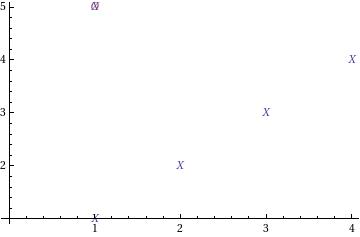
As you can see, the O plot marker has an X plot marker superimposed over it. This has now been fixed in 6.0.3 and the above command gives the following.
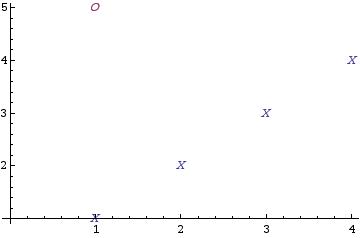
- In 6.0.2 and earlier versions, the front end could crash in specific Manipulate outputs containing a Graphics[] expression that was selected. This is fixed in 6.0.3
- In older versions of Mathematica if you tried to import a Protein Data Bank (PDB) File that had columns with no spacing between them such as
“ATOM 2980 C2 C B 62 10.650 -13.795-100.493 1.00 52.72 C “
Then the import would fail. 6.0.3 fixes this.
- Pre 6.0.3, ListPlot would ignore the SetOptions command. For example – the following two commands should produce a joined up plot.
SetOptions[ListPlot, Joined -> True];
ListPlot[Range[50]^2]
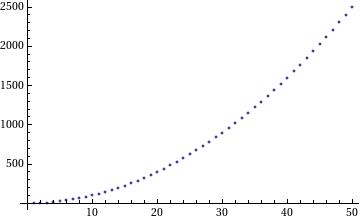
Version 6.0.3 behaves as you would expect
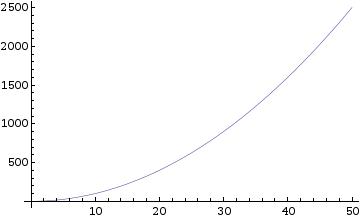
- A minor printing bug has been fixed – In 6.0.2 and earlier 6.0 versions, no cell brackets will print even if the Print cell brackets Box is Checked in the Printing Options Dialog.
- In 6.0.2 and below the AxesLabel would overlap with the tick marks on 3D plots:
Graphics3D[{}, BoxRatios -> {1, 1, 0.4}, Axes -> True, PlotRange -> {{0, 10}, {0, 0.4}, {0, 400}},PlotRangePadding -> Scaled[0.02], AxesLabel -> {t, x}]
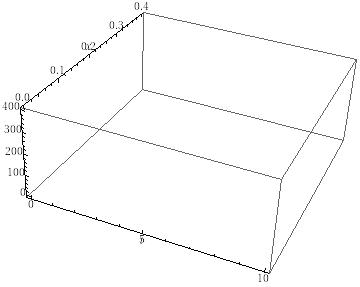
In 6.0.3 this has been fixed
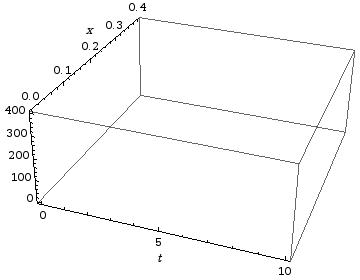
- Finally, String handling in CSV file imports has changed back to the way it is documented in Mathematica. In version 6.0.2 (but not in earlier versions), if you had a CSV file that contained something like
“hope”
1
2and you imported it into Mathematica then you would get the following result
{{“hope”}, {1}, {2}}
Now you get
{{hope}, {1}, {2}}
As far as I know – that’s pretty much it. So, in a nutshell 6.0.3 is a set of bugfixes (none of them Mathematical) along with some nice documentation additions. Nothing spectacular but pretty much what one expects for such a minor release increment. Thanks to the staff at Wolfram Research who helped me out with the details on this one.
If you found this article useful, feel free to click here to subscribe to my RSS Feed
The makers of the big mathematical applications usually have some repository of user-generated code, documentation, examples etc. For example Wolfram Research have the Wolfram Demonstrations Project and the Wolfram Library Archive whereas Mathworks have MATALB Central. I really like these sites and often find myself browsing through them when I need help or inspiration.
Maple is a package that is starting to appear on my radar more and more and it turns out that they have an equivalent code repository called the Maple Application Center. According to the site it has over 1500 Maple applications, tutorials and so on which sounds fantastic. The only problem is that I have to register before I can download anything from it. So I haven’t downloaded anything from it.
Registration is free so you may wonder why I don’t just do it. To be honest, if Maple becomes a bigger part of my life then I probably will but, right now, when I am still at the ‘messing around’ stage of interacting with Maple I just can’t be bothered with registering yet another online account. I have almost a hundred online accounts for various things and I really don’t want to create more if I don’t have to.
So Maplesoft, if you are reading this, why do you insist on me creating an account to access this very nice repository of information? Logging in is, in my opinion, an unnecessary step between the user and the good stuff. Wolfram doesn’t do it and neither does Mathworks so why do you?
Update 26th October 2009: It is no longer necessary to register. Thanks to ‘C’ for letting me know.

